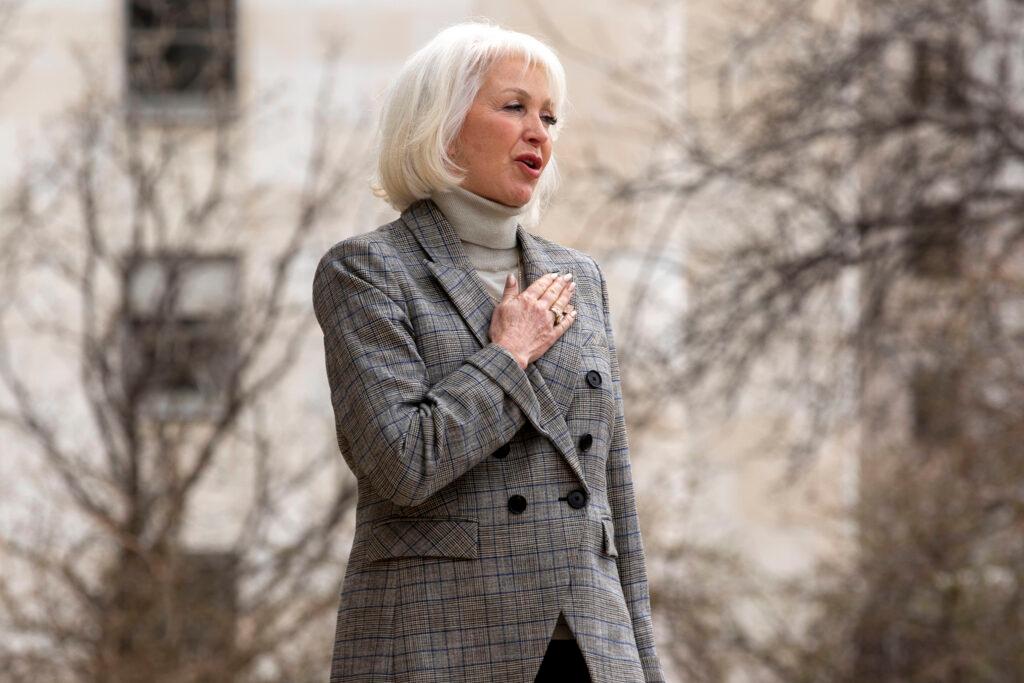
CPR is covering each day of the Peters' trial. You can read our explainer of the case here, and catch up on past days here.
Closing arguments are expected today in the trial of former Mesa County Clerk Tina Peters, who is accused of crossing legal lines to help people who believe the 2020 election was stolen access her office’s election equipment.
Testimony concluded Friday, three years to the day after the Colorado Secretary of State first announced an investigation into a potential security breach in Mesa County.
Since Peters’ actions first came to light, she’s become a cause célèbre in conservative circles working to undermine trust in the validity of the election system. As more information about the case and the investigations surrounding it became public, high profile supporters such as Steve Bannon and Mike Lindell, the CEO of MyPillow, touted her story to national audiences.
While the judge in the case has reiterated that Peters is the one on trial, not the election system, her defense has repeatedly drifted toward talk of voting conspiracies, asking questions about where Mesa County’s Dominion Voting System machines were manufactured, whether they have internet connectivity and more.
“The frustrating part is I don't know if it's a strategy or what it is,” complained 21st Judicial District Judge Matthew Barrett at one point.
Peters faces seven felony charges, including attempting to influence a public servant, identity theft, criminal impersonation and conspiracy to commit criminal impersonation. The jury will also consider three misdemeanors: first-degree official misconduct, violation of duty and failure to comply with the requirements of the Secretary of State.
Peters’ key actions in the case are not in doubt. She admits that during a secure software update of her county’s voting machines in May of 2021 she used the identity of a Fruita man named Gerald Wood to give a different man — Conan Hayes, a self-described data expert from California — access to county voting equipment. Hayes allegedly captured an image of the hard drive and took pictures of passwords, which were eventually leaked online and posted at a “cybersecurity” symposium hosted by Lindell.

The prosecution brought forward multiple people, including staff from Dominion Voting Systems and the state, as well as current and former Mesa County employees, to testify to the steps Peters took to allow Hayes to pass as Wood. That effort included misrepresenting his identity to the Secretary of State’s office, enabling Hayes to attend a secure software update. Wood himself testified that he knew nothing of Peters’ plan.
Prosecutors also spent substantial time trying to show that Peters knew she’d done something wrong, based on her reaction when the security breach started to come to light. Two former Mesa county employees, elections manager Sandra Brown and Deputy Clerk Belinda Knisley, testified that Peters called them after the passwords appeared online and said, “I’m f—d.”
Both Brown and Knisley pleaded guilty to charges related to the security breach and agreed to testify for the prosecution.
Defense argues Wood’s identity was given, not stolen
For its part, Peters’ defense team has painted her as a clerk who not only didn’t break any rules by copying her equipment’s hard drive, but in fact was acting within her authority to preserve election records (the Secretary of State and Dominion Voting Systems dispute the idea that the files updated during the secure update constitute ‘election records’ under Colorado law.)
The defense also had technical experts testify that not only were the passwords posted online blurred, they posed no security risk, because they were no longer in use.
Regarding the charge of identity theft, the defense presented evidence to try to show that Wood was in on the plan.
Much of the defense’s case rests on the testimony of Sherronna Bishop. She’s a prominent conservative activist who lived in Garfield County at the time, and prosecutors put her at the center of the plan to access the voting machines. Bishop testified that she was involved from the start — she introduced Peters to Wood and also helped bring in Conan Hayes.

While Bishop has not been charged with any crime, at one point Judge Barrett referred to her as an unindicted co-conspirator. He later advised her of her right to remain silent ahead of her testimony because of potential criminal liability.
In her testimony Bishop said Wood, who works in IT, said he didn’t have the technical expertise to capture the voting machine hard drive images but was willing to help if someone else was coming in to do it. She shared screenshots of a group chat on Signal that she said was between her, Wood and Peters.
“Tina, this is our guy,” Bishop wrote.
“That, I am,” Wood responded.
The screenshots show a message dated a day after Hayes copied the hard drives, in which the account she identified as Wood's wrote, in part, “I was glad to help out. I do hope the effort proved fruitful.”
The prosecution sought to cast doubt on the authenticity of those messages. The chief investigator for the Mesa County District Attorney’s Office, James Cannon, testified that the trial was the first he’d seen them, even though law enforcement confiscated and searched the electronic devices of all of the individuals in question. On the stand, Wood said he did not recall being a part of such a chat.
Prosecutors acknowledged that law enforcement was unable to find one of Peters’ devices.
Peters did not take the stand herself, but there was some suspense about whether she would. She attempted to get the judge to agree to conditions ahead of her testimony, including limiting the scope of cross examination by prosecutors. Barrett rebuffed those requests.
“I can't give legal advice and it's highly unusual in the circumstance that we're in right now — defendants asking me questions and looking for answers — I just can't do that,” said Barrett.
Peters said she wanted to be able to talk about her claim that at the time she believed Hayes was working with the federal government and that his identity needed shielding. However Barrett ruled that line of defense inadmissible at the start of the trial. Peters ultimately said that was why she didn’t take the stand, telling the judge she felt like she was prevented from offering a defense.
Over the weekend Bishop criticized Barrett on social media, accusing the judge of abusing his position and withholding critical testimony and evidence that would defend Peters. She also criticized him for referring to her as an unindicted co-conspirator.
“‘Guilty until proven innocent’ is the state of affairs in this Colorado side-circus show,” Bishop wrote.
Prosecutors established at the start of the trial that there is no evidence that Hayes was ever a confidential informant for the government.






